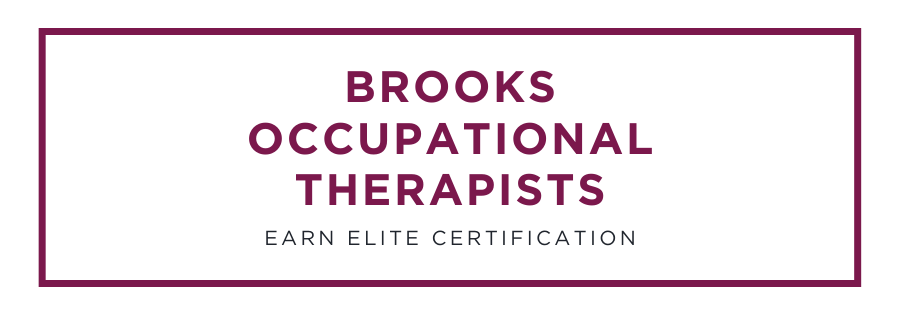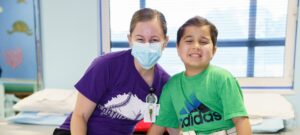Brooks Occupational Therapists Earn Elite Certification

Back to physical health resource hub
The numbers say it all: The American Occupational Therapy Association’s (AOTA’s) Board Certification in Physical Rehabilitation (BCPR) is one of the most elite professional recognitions for occupational therapists (OTs) to obtain. According to labor statistics, there are just under 145,000 practicing OTs in the US. From AOTA’s own website, only about 140 OTs in the country have earned BCPR status. Brooks Rehabilitation is now proud to currently claim seven of those BCPR holders on our staff – practically the whole contingent of BCPR holders in the state of Florida.
How does BCPR help our OTs?
How exactly does BCPR enhance an OT’s career? Sara Cristello PT, DPT, the Director of Clinical Operations at Brooks Institute of Higher Learning (IHL), explains. “When OTs graduate from occupational therapy school, they’re generalists,” said Dr. Cristello. “Pursuing the BCPR is a path that helps them move from that level to a more specialized clinician. They have to study and prepare for courses and fulfill other requirements. Ultimately the board certification is the culmination of evidence that they’ve put in the work necessary to move from a generalist to a specialist.”
Devon Cohen, OT, BCPR works at Brooks Rehabilitation Hospital. “As I was going through my schooling up in Pennsylvania, I never even thought of a fellowship or board certification,” said Cohen. “I’m really thankful that Brooks has provided this opportunity for me. To have board certification, especially at this point in my career, definitely feels really great and I’m thankful. Brooks and the IHL are on the forefront of challenging the clinicians to be better, not only for themselves in the profession, but also for our patients.”
What does it take, and why are so many at Brooks?
Current BCPR holders qualified for certification by:
- Having a professional degree in OT and being employed in the field
- Being certified or licensed and in good standing with their OT regulatory body
- Having a minimum of 5 years practice as an OT
- Having a minimum of 5,000 hours in any capacity of physical rehabilitation
- Having a minimum of 500 hours delivering OT services in physical rehabilitation within the past 5 years
- Submitting a peer-reviewed, reflective portfolio of completed work
One of the reasons for the number of BCPRs at Brooks is that the Brooks Institute of Higher Learning (IHL) offers what was the first AOTA-accredited OT Neurologic Fellowship Program in the state of Florida. Brooks’ IHL fellowship program is now currently one of only two in Florida and six in the country. The fellowship prepares occupational therapists for BCPR application to AOTA. OTs from throughout the US – like Devon Cohen – come to Brooks for the fellowship, and then many stay with us. Fellows-in-training rotate through various care settings within the Brooks Rehabilitation System, including inpatient brain injury, stroke and spinal cord injury programs, as well as our skilled nursing facilities. Throughout each care setting, fellows-in-training treat a full caseload and receive coursework, instruction, directed learning activities, and one-on-one clinical mentoring and supervision.
Michael Braun, MSOT, OTR/L, BCPR is a graduate of the Brooks OT fellowship program and, in addition to his clinical work at Brooks, is now the fellowship coordinator. “Earning the BCPR meant demonstrating mastery in a variety of criteria as determined by the AOTA. The Brooks fellowship was aligned to satisfy a good portion of those criteria,” said Braun. “The most demanding part was gathering evidence for the reviewed, reflective portfolio. In it you had to answer questions like, ‘How are we going to implement our professional development goals? How have we proved that we’ve made superior outcomes for our patients, that we’re giving the patients the evidence-based practice they need?’ It was a grueling process.”
(Please note that AOTA is changing their certification requirements in early 2022. The Brooks OT fellowship program will remain AOTA-accredited and will continue to prepare OTs for certification under the new rules. You can learn more about the revised AOTA certification by visiting the AOTA website, linked at the end of this article.)
Better patient outcomes in a complex healthcare environment
Devon Cohen notes that as a specialized clinician, a BCPR holder can deliver combined care strategies that can help bring about a patient’s recovery quicker. “A patient at the rehab hospital is often dealing with a variety of deficits – meaning physical disabilities and impairments,” said Cohen. “We take a very broad view of our patients to understand the full person and what’s going on. The end goal of occupational therapy for a patient is the ability to complete the activities of daily living (ADL), such as dressing, bathing and using the toilet. My BCPR training and experience allows me to incorporate multiple deficits into one treatment idea. This really propels that patient’s progress and achieves those outcomes in a shortened length of stay.”
That’s the ultimate key to the BCPR – the benefits for the patients. “It allows our clients to know that the therapist they’re working with is specialized in the rehab process that they’re going through,” said Braun. “It’s reassuring to clients to know that they’re working with someone who’s experienced, compassionate, trained, certified, and can give them the resources and the tools that they need for the best outcomes possible.”
“Patient outcomes, that’s what we’re here for,” said Dr. Cristello. “Helping to put programs like the fellowship into place builds our therapists’ skill sets in a variety of ways. They’re then able to really elevate patient outcomes in a very dynamic and complex healthcare environment.”
Learn more
Brooks’ BCPR OTs currently are:
- Michael Braun
- Devon Cohen
- Briana Elson
- Katie Hasse
- Mirline Milien
- Yerenis Murillo
- Ryan Patterson
Read more about AOTA’s BCPR.
Read more about Brooks’ OT Fellowship.


